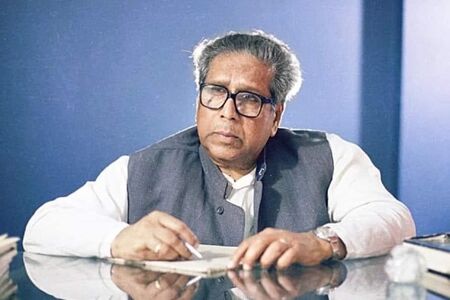Had Sagarmoy Ghosh been alive he would have touched 112. He was born on June 22, 1912.
Sagarmoy Ghosh, was a writer and editor of Desh, India's foremost literary magazine, from 1976 until 1997. Gentle and affable, Ghosh was with the magazine for more than 50 years and made it an institution amongst Bengalis. Bengal's finest literary figures contributed to the magazine and Sagarmoy made Desh a launch pad for young writers.
I had the honour of working with him over a considerable period of time. He is the only editor with whom I could not discuss matters over phone, I had to meet him in person. A giant of a man who cut across all party colour and bar. He was a comfortable with the left wing writers as the right. He is one of the person who could call the ex chief minister by his first name Buddha , as well as call Manu, Sidhartha Sharnkar Roy for a discussion.
Most of the writers and poets including Sunil Gangopadhyaya and Mani Shankar were his protégé and he enjoyed extreme respect for them to edit their writings. He enjoyed a rapport with Satyajit Ray and they spend hours on the phone discussing current trends in literature. Even writers like Gunter Grass and others who came to meet him in their Calcutta visit, came out saying that they have met an institution. The designer of The Telegraph , who also recommended design changes in Desh,Edwin Taylor was so impressed with Sagarmoy Ghosh that he compared it to none other than Punch magazine, a British institution in its own right.
Born in Comilla, in what is now Bangladesh, Sagarmoy developed a love of music and literature at the feet of Rabindranath Tagore at the poet's school in Shantiniketan. Sagarmoy's father, Kalimohan, was an associate of Tagore and Sagarmay's elder brother, Shantidev, was a famous singer of Tagore's songs - Sagarmoy himself had a strong singing voice. The artistic ambience of Shantiniketan would remain a lifelong influence.
During India's freedom struggle, Sagarmoy became active in the non-co-operation movement and he was jailed by the British. It is in jail that he meet Ashok Sarkar, editor of the Ananda Bazar Patrika, Bengal's leading newspaper. Sarkar invited him to join the newspaper group. Offered a choice of three posts, Sagarmoy opted to become Desh's assistant editor since he thought the job would leave him time to attend concerts and addas. The latter are Bengali chat sessions among friends particularly focused on politics, literature and sports.
Sagarmoy joined Desh in 1939. It marked a new era for the magazine and the start of a life-long friendship with Sarkar. Sagarmoy's first scoop was securing a poem and a short story from Tagore, Shesh Katha (the Last Story).
As editor Sagarmoy was fearless, ready to stand by his writers and face any political fall-out - including its temporary banning in Bangladesh after an article by Nirad C Chaudhuri referred to it as 'so-called Bangladesh'. Even for the novel,Prajapati by Samaresh Basu which caused sensation with its publication in 1967 in the Sharodiyo Desh .The matter came up in court and Sagarmoy Ghosh supported the author. After a long drawn legal battle the Supreme Court ruled in its favour in after 12 years in 1985.
Sagarmoy was an eminent writer but never allowed his talents to bloom. Yet he won Calcutta University's first Narayan Gangopadhyay award for his Akti Pereker Kahini (The Story of a Nail), and was the author of Sampadaker Boithake, Dandyakaranyar Bagh, and Hirer Nakchhabi. He edited four volumes of stories, essays and poems which had appeared in Desh. In 1986 he was awarded the highest honour given by Tagore's Viswa Bharati University.
Sagarmoy Ghosh died on February 19, 1999.Unill his last days Sagarbabu enjoyed his adda with friends from the literary world.
— with Sancharee Ghosh and 2 others.

